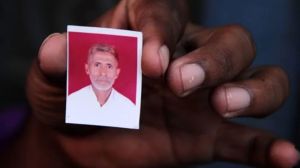Mooshahary: from clerk to Governor in same city
Forty years ago, a tribal boy from a remote village in Western Assam was compelled to take up a temporary job at the government press in Shillong...

Forty years ago, a tribal boy from a remote village in Western Assam was compelled to take up a temporary job at the government press in Shillong, then the capital of undivided Assam, for a paltry sum of Rs 80 a month. It was a serious struggle indeed because this young boy had to send half the money he earned to his parents back home at Odlaguri, some eight km from Gossaigaon in Kokrajhar. Not the one to give up, he continued with determination and perseverance, and four decades later, he has come to occupy the most important house in Shillong 8212; the Raj Bhavan.
For Ranjit Shekhar Mooshahary, former director-general of National Security Guards NSG and the Border Security Force BSF, it has indeed been a long, arduous and interesting journey from an obscure Odlaguri to Shillong Raj Bhavan. His father Shikendra Mooshahary, a primary schoolteacher, got a salary of Rs 10. He later quit teaching to become a farmer, which turned out to be a wrong decision. As a student, he didn8217;t have money to come to Shillong for higher education. It was only after the villagers contributed money for his education that he finally came to Shillong with Rs 700.
8220;I always believe in hard work. It can take you anywhere. But I often regret that most of our young boys and girls in Assam do not want to work hard. They think there is a short cut to success,8221; said the new Meghalaya Governor.
Even during his IPS career, spanning from 1967 to 2006 when he took voluntary retirement, Mooshahary would find time to interact with students and young people, whether after office hours or during his visit back home on leave. 8220;I still remember how Ranjit da appeared from nowhere on a jeep and pulled me up for wasting my time in tilling the land after I had just taken my BA exams. 8216;Go, prepare for civil services, don8217;t waste your time looking for a clerk8217;s job in the state Government, he would say8217;,8221; recalled one senior officer of an all-India service who also hails from Gossaigaon.
Mooshahary, who cleared his IPS in one shot and was the youngest in the 1967 batch, didn8217;t have either money or clothes to go to Mussorie for training. One Mr Dutta, a UDC in AG office, gave him Rs 1500 without even asking when he would return it. He finally returned the money six years after becoming an IPS officer.
His success story has motivated several others to dream big. Gossaigaon today has at least three IAS officers including Mooshahary8217;s younger brother Bhaskar Mushahary, a senior IAS officer, HS Brahma, currently joint secretary in the Union Home Ministry and Hemanta Narzary, an Assam-Meghalaya-cadre IAS officer, besides Sanjay Narzary, a Rajasthan-cadre IPS officer. And all of them come from the Bodo tribe whose language has been recognised as an Eighth Schedule language only a couple of years ago.
8220;It is mostly because of Ranjit da that young people in our area have been motivated to go for competitive exams in order to get jobs. We have to work hard, but then we don8217;t have to pay bribes to get state Government jobs,8221; said an officer from Gossaigaon who refused to be named.
When asked about his big dream, Mooshahary said he always wanted to become a politician but could not go for it as he had to earn for his family. 8220;I didn8217;t see politics as a career for earning a livelihood,8221; he said. When asked if he would like to join a political party now, he said he didn8217;t know what stored for him in future.
Mooshahary, 62, after taking over as the Meghalaya Governor on Tuesday, said he would not remain a mere 8220;institutional head8221; of the state, but would lead from the front to motivate the people to fight corruption by using the RTI Act. 8220;States of the northeastern region are trapped into a whirlpool of corruption and an institutional arrangement is required to drag them out of this menace,8221; he said. His concern over corruption, incidentally, came close on the heels of a report by India Corruption Study, 2007, by Transparency International, which listed Assam as the 8220;most corrupt state8221; in the country. Meghalaya, too, featured on top of the list.
As former DG of BSF, he would also definitely keep an eye on the Bangladesh border to check infiltration. As BSF chief, Mooshahary had heated discussions with his Bangladesh counterparts over the presence of rebel leaders from the Northeast in that country, a fact India8217;s neighbour generally denies.
- 01
- 02
- 03
- 04
- 05































